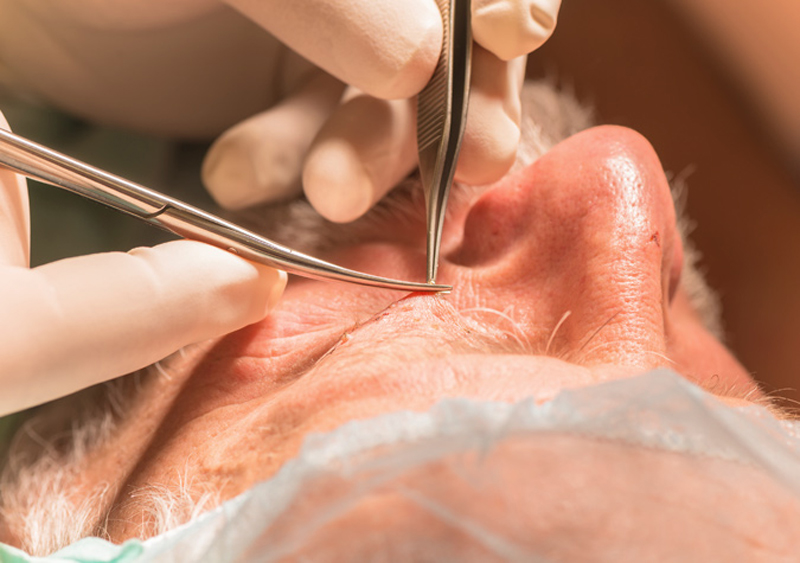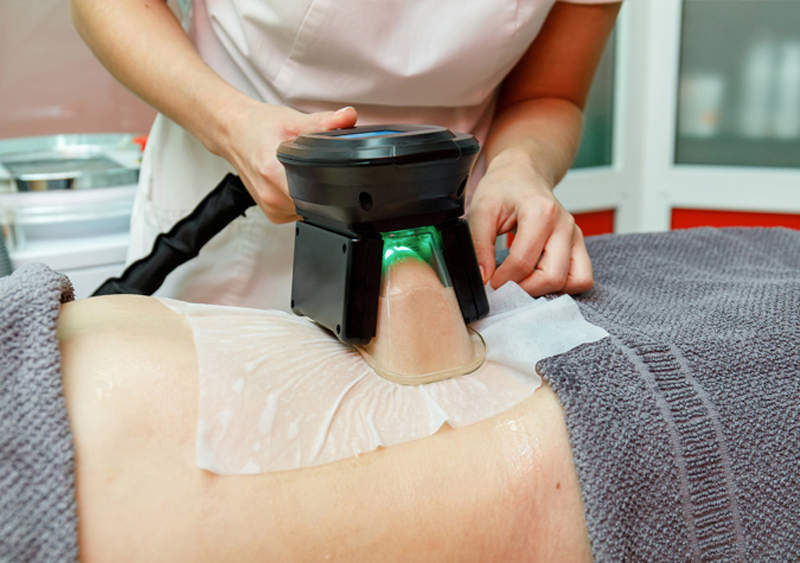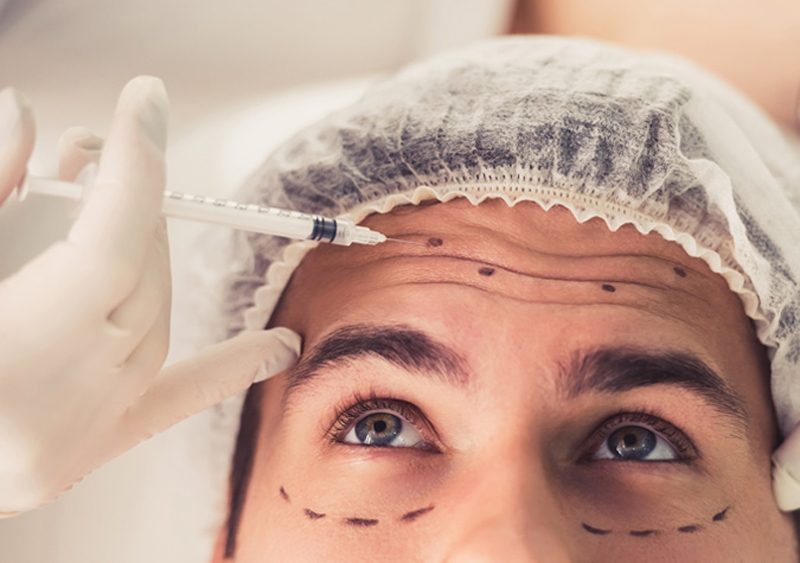Hair transplants, fat reduction, penis extensions: 5 men tell us why they did it

By Tom Fordy, FashionBeans
As the parameters of what it means to be a man become more fluid, the face of masculinity is changing. Quite literally, in fact, as the number of men having cosmetic surgery and other procedures continues to rise. And it’s not just our faces, but our bodies and even our balls, with men opting for the eye-wateringly popular scrotal lift, among a growing menu of accessible and increasingly affordable procedures.
The American Society of Plastic Surgeons found there were 1.3 million cosmetic procedures performed on men in 2017 – a 29 per cent increase since 2000. While the British Association of Aesthetic Plastic Surgeons found that the number of Brits men having cosmetic surgeries fell by 4.7 per cent in 2018, it gave way to the popularity of non-surgical procedures, such as Botox, fillers, and DermaRollers.
What is making men have cosmetic procedures? Is it simply because they’re more available? Has Instagram and selfie culture made us want a permanent filter for our faces? Have men fundamentally changed?
“I think men are changing and culture is, too,” says Deborah Sandler, a psychotherapist and cosmetic surgery counsellor. “Social media has had an important role in promoting greater emphasis on physical appearance. Most people are dissatisfied with some part or parts of their body.
“There’s lots of debate currently about how men can retain their strong sense of masculinity as women take a more self-assertive role. And there are, of course, particular issues for LGBT people. As procedures become more available and talked about without embarrassment, men may feel freer to do something about their appearance.”
Negative body image remains a taboo, largely unspoken anxiety for some men. According to a 2017 study, 45 per cent of Western men were dissatisfied with their bodies – rising from just 15 per cent over 25 years. Fat, male pattern baldness and penis size are among body image issues that affect men.

“It can be a massive problem, severely limiting their enjoyment of life and their social wellbeing,” says Sandler. “There are many possible factors that may adversely affect body image in men and make them feel at a physical disadvantage, from actual inborn problems to teasing and bullying at a young age, and from the signs of ageing and sedentary lifestyles to simple male competitiveness.”
Alex Karidis, a cosmetic surgeon and founder of the Karidis clinic in London, thinks men are affected by the images around them. “There are always magazines and videos promoting the ultimate bod or workout,” he says. “I guess this does affect men’s perceptions of ideal body but I don’t believe there is a true ideal that everyone aspires to.”
Karidis says the most popular surgeries for men are fat removal, nose jobs, eye jobs, and man boob reduction (gynecomastia), a procedure he says has “evolved significantly”. There are also ongoing advancements in non-surgical skin tightening, sweat-reduction technology, eye bag surgery (blepharoplasty), and facelift techniques.
Men’s procedures have become so popular, that New York plastic surgeon Dr Norman Rowe has opened a men-only cosmetic surgery called The Club House.
“Over the years I’ve been practicing I’ve noticed that the number of men making appointments has steadily increased by about 15 per cent every year,” says Dr Rowe. “Moreover, about 90 per cent of my male patients are repeat clients, coming back for routine treatments or trying out new ones.”

Dr Rowe describes his most popular procedures as “tweakments”, subtle, non-invasive, non-surgical options, such as hair loss treatments, penile augmentations, “brotox”, and laser fat reduction. It’s the marginal gains approach to your appearance. Quite extreme by most people’s standards, but for those who book repeat appointments, it’s just maintenance.
National practitioner registry Save Face warns against getting non-surgical procedures from unqualified or untrained people, and Sandler recommends both pre- and post-procedure counselling.
“If cosmetic work can give men a greater sense of personal confidence in their job and social life that must be a good thing,” she says. “But if commercial pressures and commercially-biased sources of information push men into expensive procedures with the potential to cause psychological harm, that can be very damaging.”
To understand what makes men have cosmetic procedures – and the effect is has on their lives – we spoke to five men about their experiences.

“I’ve always been in the hair and beauty industry and initially I felt pressure from that industry to look my best all the time. I’ve always been quite negative about myself and my body. That’s the biggest reason I have work done – to feel more confident.
“I have fillers in my lips, my chin, my jaw, and my cheeks – and Botox in my forehead and veneers on my teeth. I go roughly every four of five months for top-ups.
“When you first have it done you get so used to your face looking that way. And when it starts to wear off you’re craving more. One thing led to the next, and that led to the next… 100 per cent it’s addictive.

“I think I feel pressure being an influencer now that my following has grown. Quite a lot of my followers follow me because I’ve had work done. If I’ve had my lips done [for] a few months, someone will message me to let me know my lips are smaller, or I’m not as tanned. They can be quite brutal.
“I’m probably fine with having the non-permanent procedures, but I suppose if there was an option to have my cheeks done permanently I might do that. I’m probably being influenced by other influencers without realising it – newspapers and magazines and online pictures.
“I’m a lot happier and more confident. But when the work wears off, that’s when I feel shitty about myself. I get insecure and have to go for a top-up – it’s like a vicious circle. I’m totally self aware about it. It’s just something I can’t seem to change. I still have those body image issues and insecurities.”
Follow Sam @samtaylor94

“Some men suit the bald look and they embrace, but I wasn’t one of those men. I tried to conceal it by getting my hair cut short and using a keratin powder.
“I chose to go Turkey for a number of reasons – my friend had had his hair done at the clinic, which gave me some reassurance, and the price of the procedure was probably a third of what it is in the UK. That also included two nights in a hotel and airport transfers.
“I didn’t have pressure from anyone to get it done – I was more preoccupied with my hair than anyone else. I had a lot of female friends who were trying to be nice and would say, ‘Oh you don’t need that done!’ which isn’t helpful. The same people six months later would say it looked fantastic.

“There is a certain image that’s considered attractive for a man in his thirties – a gym fit body and beards are more popular now. I would look at someone like David Beckham.
“It’s been five years and there has been a bit of thinning around the parts I didn’t have transplanted. I’ve considered going back to get a top-up. I also get Botox and I’ve had laser hair removal on my back and shoulders, and would consider doing my chest as well.
“Everything I’ve had done has been very positive. I think people should embrace it. Looking after your appearance, as long as you don’t take it to obsessive levels, isn’t something than men should have to apologise for.”
Follow Marty @martypilkiewicz
The American Society of Plastic Surgeons found there were 1.3 million cosmetic procedures performed on men in 2017 – a 29 per cent increase since 2000. While the British Association of Aesthetic Plastic Surgeons found that the number of Brits men having cosmetic surgeries fell by 4.7 per cent in 2018, it gave way to the popularity of non-surgical procedures, such as Botox, fillers, and DermaRollers.
What is making men have cosmetic procedures? Is it simply because they’re more available? Has Instagram and selfie culture made us want a permanent filter for our faces? Have men fundamentally changed?
“I think men are changing and culture is, too,” says Deborah Sandler, a psychotherapist and cosmetic surgery counsellor. “Social media has had an important role in promoting greater emphasis on physical appearance. Most people are dissatisfied with some part or parts of their body.
“There’s lots of debate currently about how men can retain their strong sense of masculinity as women take a more self-assertive role. And there are, of course, particular issues for LGBT people. As procedures become more available and talked about without embarrassment, men may feel freer to do something about their appearance.”
Negative body image remains a taboo, largely unspoken anxiety for some men. According to a 2017 study, 45 per cent of Western men were dissatisfied with their bodies – rising from just 15 per cent over 25 years. Fat, male pattern baldness and penis size are among body image issues that affect men.

Alex Karidis, a cosmetic surgeon and founder of the Karidis clinic in London, thinks men are affected by the images around them. “There are always magazines and videos promoting the ultimate bod or workout,” he says. “I guess this does affect men’s perceptions of ideal body but I don’t believe there is a true ideal that everyone aspires to.”
Karidis says the most popular surgeries for men are fat removal, nose jobs, eye jobs, and man boob reduction (gynecomastia), a procedure he says has “evolved significantly”. There are also ongoing advancements in non-surgical skin tightening, sweat-reduction technology, eye bag surgery (blepharoplasty), and facelift techniques.
Men’s procedures have become so popular, that New York plastic surgeon Dr Norman Rowe has opened a men-only cosmetic surgery called The Club House.
“Over the years I’ve been practicing I’ve noticed that the number of men making appointments has steadily increased by about 15 per cent every year,” says Dr Rowe. “Moreover, about 90 per cent of my male patients are repeat clients, coming back for routine treatments or trying out new ones.”

National practitioner registry Save Face warns against getting non-surgical procedures from unqualified or untrained people, and Sandler recommends both pre- and post-procedure counselling.
“If cosmetic work can give men a greater sense of personal confidence in their job and social life that must be a good thing,” she says. “But if commercial pressures and commercially-biased sources of information push men into expensive procedures with the potential to cause psychological harm, that can be very damaging.”
To understand what makes men have cosmetic procedures – and the effect is has on their lives – we spoke to five men about their experiences.

I had Botox At 19
Sam Taylor, 25, is a hair stylist and influencer from Merthyr Tydfil. He had his first Botox aged 19 and has had multiple filler procedures.“I’ve always been in the hair and beauty industry and initially I felt pressure from that industry to look my best all the time. I’ve always been quite negative about myself and my body. That’s the biggest reason I have work done – to feel more confident.
“I have fillers in my lips, my chin, my jaw, and my cheeks – and Botox in my forehead and veneers on my teeth. I go roughly every four of five months for top-ups.
“When you first have it done you get so used to your face looking that way. And when it starts to wear off you’re craving more. One thing led to the next, and that led to the next… 100 per cent it’s addictive.

“I’m probably fine with having the non-permanent procedures, but I suppose if there was an option to have my cheeks done permanently I might do that. I’m probably being influenced by other influencers without realising it – newspapers and magazines and online pictures.
“I’m a lot happier and more confident. But when the work wears off, that’s when I feel shitty about myself. I get insecure and have to go for a top-up – it’s like a vicious circle. I’m totally self aware about it. It’s just something I can’t seem to change. I still have those body image issues and insecurities.”
Follow Sam @samtaylor94

I Got A Hair Transplant In Turkey
Marty Pilkiewicz, 36, is an interpreter from Belfast. He began losing his hair in his mid-late 20s and travelled to Turkey aged 31 to have a hair transplant.“Some men suit the bald look and they embrace, but I wasn’t one of those men. I tried to conceal it by getting my hair cut short and using a keratin powder.
“I chose to go Turkey for a number of reasons – my friend had had his hair done at the clinic, which gave me some reassurance, and the price of the procedure was probably a third of what it is in the UK. That also included two nights in a hotel and airport transfers.
“I didn’t have pressure from anyone to get it done – I was more preoccupied with my hair than anyone else. I had a lot of female friends who were trying to be nice and would say, ‘Oh you don’t need that done!’ which isn’t helpful. The same people six months later would say it looked fantastic.

“It’s been five years and there has been a bit of thinning around the parts I didn’t have transplanted. I’ve considered going back to get a top-up. I also get Botox and I’ve had laser hair removal on my back and shoulders, and would consider doing my chest as well.
“Everything I’ve had done has been very positive. I think people should embrace it. Looking after your appearance, as long as you don’t take it to obsessive levels, isn’t something than men should have to apologise for.”
Follow Marty @martypilkiewicz

I Literally Burned My Fat Away
Jack visited The Club House for TruSculpt iD, a non-invasive fat-reduction procedure that burns fat cells to contour the body. His treatment consisted of three 15-minute sessions.“I consider myself a relatively healthy person, but I don’t have a lot of time to work out, so when I realised that these sessions were quick and effective, I figured, ‘Why not give it a shot?’ I didn’t want to spend another summer worried about how I looked at the beach or pool.
“Self-confidence and body issues haven’t dominated my life, but they’ve definitely been in the back of my head for many years. I’ve had my moments when I’ve felt uncomfortable at the beach or at a wedding because of how I looked. Even as a guy there’s pressure to look a certain way, though it may not be as obvious as some of the pressures that women face.
“The results weren’t immediate, but I left the office feeling pretty dang good about myself. I started seeing the changes a few weeks after. Each time I got the treatment, I felt more confident in myself and my new trimmer body.
“I’d say I’m more confident and comfortable this summer compared to summers passed since I feel better about the way I look. It’s let me go out of my comfort zone a bit more and really enjoy the summer.
“I’m so satisfied with the results, I’d consider going back again before next summer or an upcoming vacation for a little extra help slimming down. I can definitely see how the increased confidence can leave people wanting more.
“Since I’ve tackled my biggest insecurity, I’m pretty content right now. Down the line, maybe I’ll explore laser hair removal or Botox for my inevitable forehead wrinkles…”

I Spent £20k On My Face
Liam Hale, 33, is a singer and reality TV personality. He was known as a celebrity lookalike and spent £20,000 trying to change his face.“I wasn’t getting booked for being a singer, but because I looked a bit like [British TV presenter] Alan Carr. I decided to go on a journey and create an image for myself in showbiz.
“I’d put on weight and wanted to change the shape of my face. I got Botox and fillers in my cheeks. I got non-surgical jaw alignment and I have a bit of a bum chin, so I had that filled as well. After that I wasn’t happy with my skin, so I had a skin peel. I almost went as far as getting liposuction for a TV show. I was trying to get the most fabulous look as quickest way I could to elevate my show business my career.
“It gave me a lot confidence on the outside. I was fresh faced and had lost a bit of weight. People in the same showbiz circles were giving me compliments, but people who knew me as a person thought, ‘This isn’t Liam’.

“I’m in the process of getting teeth done, which will be permanent, but I’ve always thought of teeth and hair as different to cosmetic procedures that change your whole face.
“I’m 100 per cent glad I’ve gone through it. Now I’m championing the fact you should just be yourself. I don’t regret the journey – I regret the money I spent.”
Follow Liam at @lhalewood

I’m Going To Have A Penis Filler
Steve, 46, is planning to have a penis filler procedure – which involves injecting the penis with Hyaluronic acid – and is in the consultation stage. He explains why he is considering having the procedure.“It’s a number of things, really – it’s for confidence and because I feel like I’m below average, and want to do something about it. I suppose a lot of it is to do with modern society and pressures on you to be perfect – it’s people’s outlooks on stuff like that. I saw something about the procedure in the paper so did a bit research. At this stage there’s nothing holding me back from doing it.
“I won’t be having cosmetic surgery done on any other part of my body – I’m in good shape for my age, apart from, well, that. Penis size has affected my confidence in relationships – it’s had a knock-on effect across the board. This isn’t coming from my partner – she’ll benefit from it obviously, but there’s no pressure. I can’t see how it won’t have a positive effect on my life. I don’t mind how big it gets – just as long as it doesn’t pop I think you’re alright.”
Find out more at Moorgate Andrology
![[feature] What Men Really Think About Cosmetic Surgery](https://blogger.googleusercontent.com/img/b/R29vZ2xl/AVvXsEg9PhSRYLmMZ8g11FD1e4MNA7-nXJjeGW6A0Gy1KVoGdU-j-DdyNI2mMV7wdMVEagrGa_kjh1eoubgAePfrkX5Aj7Ui-JJvbzb3gb0S5Y-kV63eqPIJDz0WCBsLmlRb_o1G1s3JvyNruMBK/s1600/womens.dearjulius.com.jpg)






















